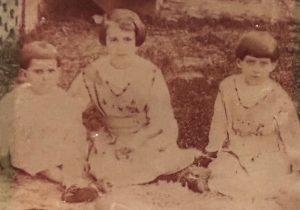My Grandmother’s Pound Cake
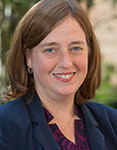 Emily’s Story
Emily’s Story
Emily Viverette is the Director of FaithHealth Chaplaincy and Education at Wake Forest Baptist Medical Center. She is a minister affiliated with the Christian Church (Disciples of Christ) and a graduate of Elon University (B.S.) and Vanderbilt Divinity School (M.Div.). Prior to seminary, Emily taught high school math. Emily served as the Director of Clinical Pastoral Education (CPE) at Alamance Regional Medical Center before joining the faculty at Wake Forest in 2009.
Hear Emily read her story
My grandmother Eloise always had a pound cake at her house. If there wasn’t one on the counter in the oversized cookie tin, there was one in the freezer. I remember standing beside her in her spotlessly scrubbed kitchen, helping her to measure out the ingredients. She was insistent that the dry ingredients always be sifted three times.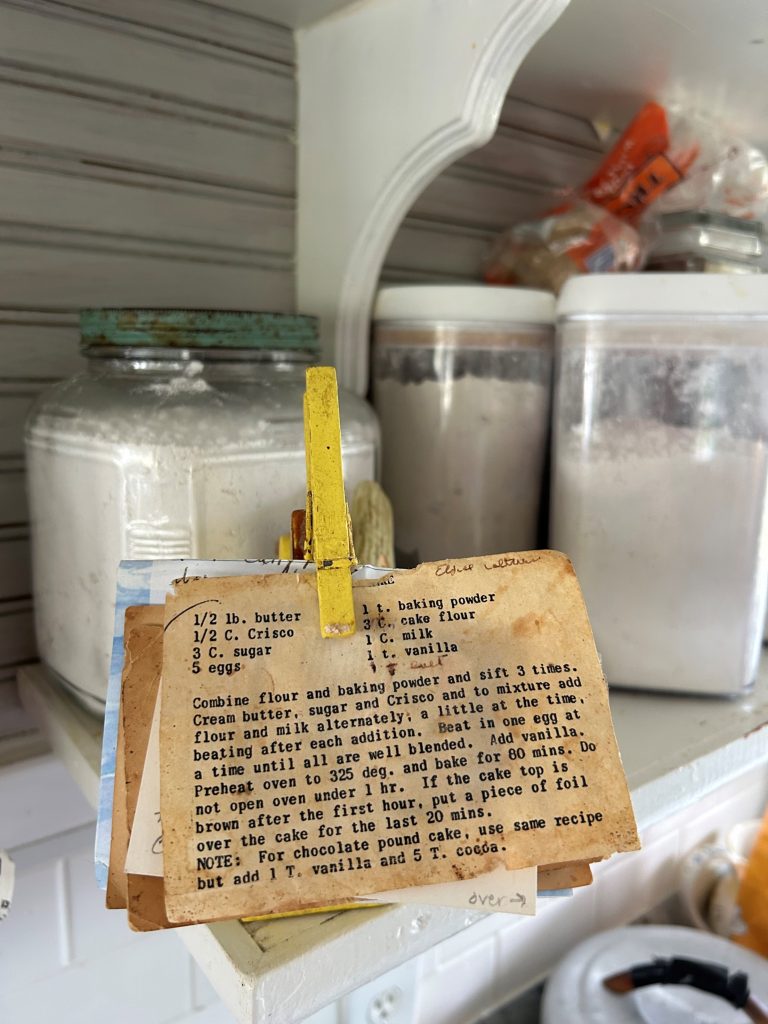
This was my grandmother’s ministry. She made these cakes for all occasions—for celebrations, illnesses, trips, and deaths. She was a woman of few words, so she expressed her love and concern by baking these practical cakes for others. The only extravagant ingredient in my grandmother’s cake was vanilla—and only a teaspoon. Almost anyone can find the ingredients for a pound cake in their own kitchen—flour, sugar, butter, eggs, milk, baking powder, salt and vanilla—that’s it. It is an entirely practical cake—no frills—no icing—it travels well and freezes well.
As a child of the Great Depression, Eloise was a no-nonsense, practical woman. She was not a warm and fuzzy, touchy-feely grandmother. Tired of how people could never get her name right, she legally changed it from Ella Louise to Eloise since that is what everyone called her. She had a big heart and a sharp tongue and was opinionated with a strong sense of right and wrong. Her growing-up years were difficult. Her father’s drinking made him unreliable. Her other was left to raise seven children, mostly alone.
When her mother died young from an unknown cancer, Eloise, as one of the older siblings, took in her youngest sister while navigating her young marriage. She did not trust others would or could take care of her, so she worked hard to take care of herself and everyone else.
Busyness was her superpower, but it was not busyness just for the sake of busyness. It was busy with a purpose. Eloise rarely sat still. While sitting, her hands were still moving—cracking pecans, polishing silver, peeling apples. The local grocery store manager would call her when he was about to throw out apples or pears that were going bad. She would pick them up, peel them, stew them with sugar, and freeze them. Nothing was wasted. These apples or pears accompanied nearly every meal served by her. Few people left her house without something from her freezer, whether it was a pound cake, apples, pears or corn our family put up in the summers.
I believe she knew what Desmond Tutu and the Dalai Lama spoke about regarding compassion. Archbishop Tutu noted, “But when you say, ‘How can I help?’ even amid your deep anguish, it’s got an alchemy that transforms your pain. It may not take it away. But it becomes in a way bearable, more than it was at the time when you were just saying ‘poor me,’ thinking only about yourself.” Dalai Lama et al (2016)
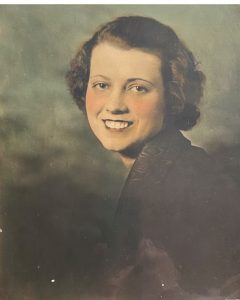 Eloise experienced much hurt as a child and young adult, which I knew haunted her, but she never let it slow her down. With her faithfulness to the church, I believe that her sufferings fuelled her service in the world. She was one of many strong women in the small Baptist church of my childhood who organized, ran and led the church’s work. They may not have been visible during the worship service, but the church wouldn’t have happened without them.
Eloise experienced much hurt as a child and young adult, which I knew haunted her, but she never let it slow her down. With her faithfulness to the church, I believe that her sufferings fuelled her service in the world. She was one of many strong women in the small Baptist church of my childhood who organized, ran and led the church’s work. They may not have been visible during the worship service, but the church wouldn’t have happened without them.
Eloise was the one who taught my mother and who then, in turn, taught my sisters and me about what it meant to be of use in this broken world and, more importantly, to be of use in ways that serve others.
Eloise died in 2009 after living with the after-effects of a stroke for five years. This faithful, busy, purpose-driven woman learned late in life also what it meant to be served. Reluctantly, she learned to allow her daughters and others to care for her intimately. It was not easy to feel purposeful when busyness was no longer her superpower.
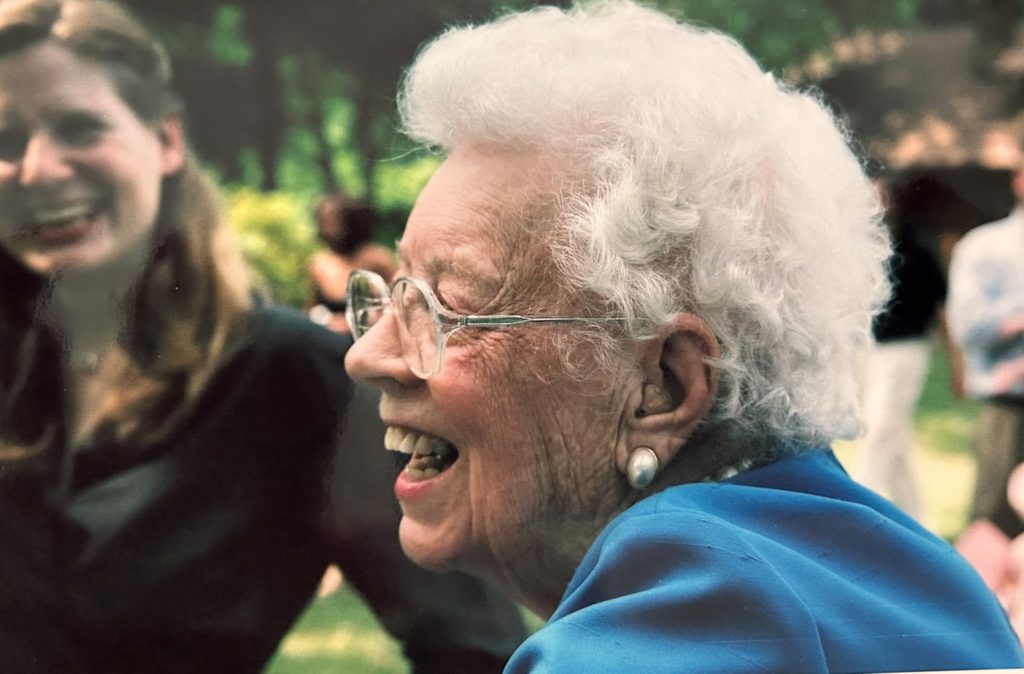 Finally, however, she learned one of her last lessons. She realized that she could trust others to care for her and allow others to experience the same purposeful, practical service she had faithfully offered throughout her long life.
Finally, however, she learned one of her last lessons. She realized that she could trust others to care for her and allow others to experience the same purposeful, practical service she had faithfully offered throughout her long life.
Watch a video of Emily’s story
What do you think?
Emily’s grandmother, Eloise faced a magnificent choice when faced with brokenness, either to use it as an excuse to do nothing or as a reason to wake up and do something. Her dogged selflessness was expressed in the ritual of baking and providing her simple pound cake. Not a grand gesture but a constant one of care and consideration.
Read this poem by Marge Piercy.
To Be of Use
By Marge Piercy
The people I love the best
jump into work head first
without dallying in the shallows
and swim off with sure strokes almost out of sight.
They seem to become natives of that element,
the black sleek heads of seals
bouncing like half-submerged balls.
I love people who harness themselves, an ox to a heavy cart,
who pull like water buffalo, with massive patience,
who strain in the mud and the muck to move things forward,
who do what has to be done, again and again.
I want to be with people who submerge
in the task, who go into the fields to harvest
and work in a row and pass the bags along,
who are not parlor generals and field deserters
but move in a common rhythm
when the food must come in or the fire be put out.
The work of the world is common as mud.
Botched, it smears the hands, crumbles to dust.
But the thing worth doing well done
has a shape that satisfies, clean and evident.
Greek amphoras for wine or oil,
Hopi vases that held corn, are put in museums,
but you know they were made to be used.
The pitcher cries for water to carry
and a person for work that is real.
Questions for Discussion
- Do you see connections to Eloise in this poem?
- What do you think about how God wants us to face challenges? Are we called to “wake up and do something” or “move in a common rhythm when the food must come in or the fire be put out” as Eloise did and Marge Piercy suggests? Are there other ways we can respond to life’s challenges?
- What are the ways that you express faithfulness and servanthood?
- Eloise and the people that Marge Piercy loves best seem to describe the Biblical character of Martha (Luke 10: 38-42). Martha often is seen as less faithful than Mary who chose to sit at Jesus’ feet rather than doing the work of the house and hosting, as Martha did. How do you see Martha?
- After reading Emily’s story and this poem, how can you connect them to the meaning of the Biblical story of Mary and Martha?


